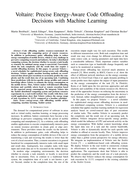New accepted paper at the IEEE International Conference on Pervasive Computing and Communications (PerCom) [28.01.21]
Christian Krupitzer from the Department of Food Informatics is co-author of the peer-reviewed conference paper "Voltaire: Precise Energy-Aware Code Offloading Decisions with Machine Learning" at the IEEE International Conference on Pervasive Computing and Communications (PerCom) (CORE Rating: A+).The publication "Voltaire: Precise Energy-Aware Code Offloading Decisions with Machine Learning" by Martin Breitbach (University of Mannheim) with co-authors Janick Edinger (Universität Hamburg), Siim Kaupmees (University of Cambrigde, United Kingdom Great Britain), Heiko Trötsch (University of Mannheim), Christian Krupitzer (Department of Food Informatics, University of Hohenheim) and Christian Becker (University of Mannheim) was accepted at the IEEE International Conference on Pervasive Computing and Communications (PerCom) (CORE Rating: A+; peer-reviewed). The International Conference on Pervasive Computing and Communications, sponsored by IEEE, is the premier conference for presenting scholarly research in pervasive computing and communications.
Code offloading enables resource-constrained devices to leverage idle computing power of remote resources. In addition to performance gains, offloading helps to reduce energy consumption of mobile devices, which is a key challenge in pervasive computing research and industry. In today's distributed computing systems, the decision whether to execute a task locally or remotely for minimal energy usage is non-trivial. Uncertainty about the task complexity and the result data size require a careful offloading decision. In this paper, we present Voltaire- a novel scheduler for sophisticated energy-aware code offloading decisions. Voltaire applies machine learning methods on crowd-sourced data about past executions to accurately predict the complexity and the result data size of an upcoming task. Combining these predictions with device-specific energy profiles and context knowledge allows Voltaire to estimate the energy consumption on the mobile device. Thus, Voltaire makes well-informed offloading decisions and carefully selects local or remote execution based on the expected energy consumption. We integrate Voltaire into the Tasklet distributed computing system and perform extensive experiments in a real-world testbed. Our results with three real-world applications show that Voltaire reduces the energy usage of task executions by 12.5% compared to a baseline scheduler.
The publication is available in the IEEE Xplore digital library.


